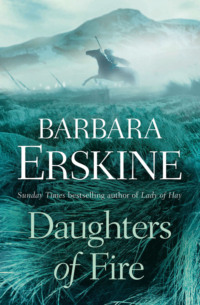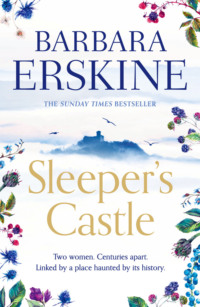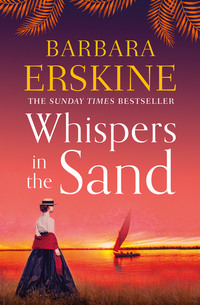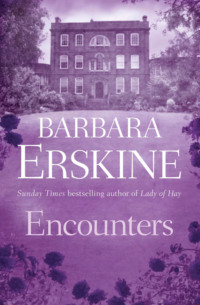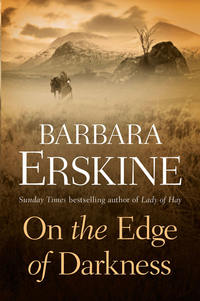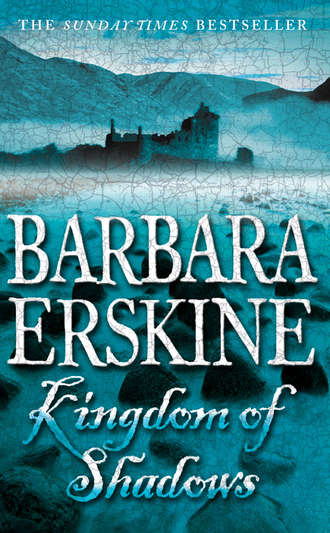
Полная версия
Kingdom of Shadows
‘Let us hope they are here before darkness comes,’ she said as calmly as she could. She turned to the harper. ‘Pray, play something more cheerful for us before we retire to bed.’
Isobel knew instinctively that her mother was excited; she knew she hoped for her father to return soon, but she did not care. Small as she was she had nursed in her heart her father’s scorn and it had festered.
‘Well, sir, are you not to play for us tonight?’ Joanna turned sharply on the harper, who had continued merely to stroke out gentle meaningless chords from his instrument. He turned his face in the direction of her voice and opened his mouth as though to say something, then he changed his mind. Instead he began to play a soft haunting melody, stroking sounds of loneliness and mourning from the golden wires of his instrument. It was a sound so desolate that after a few moments all conversation came to a stop, and the women turned, troubled, towards him. Even Isobel, playing sleepily with the doll Lord Buchan had given her, had turned from examining the exotic green silk in which its limbs were swathed and looked up from her toy. She had been filled suddenly with a terrible, inexplicable feeling of dread, a feeling she did not even understand. Climbing to her feet she had gone over to the musician, and stood for a while, gazing intently into his face. He had at once sensed the child close to him, and turned to smile at her, although he did not cease playing. ‘Stop playing that sad tune!’ she ordered suddenly. He took no notice. ‘Stop it!’ she cried again, stamping her foot. ‘Stop it, stop it, I don’t like it. Make him stop!’ She turned tearfully to the fire.
Mairi hastily rose to her feet. ‘With your permission, my lady, I will take her to bed,’ she said nervously.
Before she could reach the child though, Isobel had leaned forward and wrenched the old man’s hand from the strings. ‘Stop it! Stop it! Stop it!’ she screamed again. There was an anguished arpeggio of notes from the instrument, and then silence.
Joanna straightened, horrified.
‘Take her upstairs,’ she ordered. ‘Take her upstairs and whip her!’ She looked at the old man almost in fear. His fingers were gently feeling the frame of his instrument, nursing the sharp ends where two wires had been torn from their anchorage.
At her words, however, he looked up and put out his hand to Isobel who had not moved. ‘Do not punish the child,’ he said softly. ‘She and only she understood the message of my tune. Do not be angry because it struck terror into her heart. I spoke to her of destiny and of death; of duty towards men and towards kingdoms. As yet she does not understand, but she felt fear at what life holds in store for her. Fear which you too should feel, madam, for all you bear a son in your womb!’
‘A son!’ Joanna put her hand to her belly in wonder. ‘How do you know?’
‘I know.’
She shook her head, still shocked and distressed by what had happened. ‘But your harp! She has broken your harp.’
Master Elias put the harp down on the floor beside him and, groping for his stick, he rose to his feet. Making his way towards the door, the old man paused for a moment beside her. ‘My harp can be mended, Lady Joanna,’ he commented tersely. Without another word he made his way to the door, feeling before him gently with his stick. The boy rushed forward to open the heavy door for him, and the old man disappeared slowly down the dark draughty stair, the sound of the tapping of his stick, and the soft shuffling of his fur robe on the stone steps, coming up to them long after he had gone.
There was a moment of silence, then Mairi had taken Isobel by the hand. ‘Come along, my little love,’ she said softly. ‘Trobhad seo, Iseabail, tha tha thîd agad dhol dhan leabaidh. We’ll away to our bed.’ Silently they too crossed to the door, but as they reached it, the sound of hasty footsteps came up to them from below and the ring of spurs on stone.
Pulling Isobel to her, Mairi waited. Joanna had risen from her chair at the sound, her cheeks pale, and her own breath coming sharply as the steps came panting up the stair. Behind her the other women rose looking at one another in consternation. Mairi put her arm around the child’s shoulders protectively, and looked at the countess, who was standing clasping the back of her chair as two men appeared at the top of the stairs. They wore the livery of the Earl of Fife, but their clothes were torn and spattered with dried mud and dust.
One, the taller of the two, stopped abruptly, and remained by the door, awkwardly fingering his sword hilt; the other strode straight to where Joanna stood, and went down on one knee before her. His face was lined and tired and his expression was grim. There was a moment of silence as he knelt unspeaking, his eyes fixed on the hem of her gown.
Looking down at his heaving shoulders, Joanna had hardly dared speak. Her own heart was thumping with fear as she waited for him to say something. ‘Well?’ she cried at last, unable to bear his silence.
‘My lady, I have dreadful news.’ The man made a visible effort to collect himself, then paused again, uncertain how to continue.
‘You bring word from the earl my husband?’ she prompted.
He winced as though she had struck him. ‘My lady, we were riding towards Brechin. It was growing dark, and the men were tired. The earl wanted to reach the burgh before dusk. My lady, we were ambushed.’ His voice was scarcely audible as he continued with a rush. ‘There were so many of them, hiding by the roadside. We stood no chance, my lady! We shouted at them! There must have been a mistake.’ He was appealing to her now. ‘They were lying in wait for someone else. It was twilight and hard to see. We shouted, my lady! They were the earl’s kinsmen, my lady! They wore the livery of the Abernethys. We fought them off as best we could, my lady, but two of our comrades were killed and … and …’
Joanna was no longer listening. The words washed over her with the icy rush of a mountain waterfall. Everything inside her had gone cold and the room was silent.
Isobel held her breath. It was as if the whole world had stopped breathing with her. Then she heard the man again. He rushed on, talking desperately into the silence. She barely understood his words, but she knew what they meant. Her father was dead. And she was glad.
‘… He did not stand a chance … they did not give him a chance to fight fair! He was murdered … murdered by his own kin.’ The man was blubbering now, like a child. His companion remained, as though stunned, rooted to the spot by the door.
Suddenly Joanna turned on the kneeling man, her eyes blazing, half in tears, half in anger.
‘And how, sir, does it happen that you are still alive? Did you flee from aiding my lord to save your own skin?’ She almost spat the words at him.
The man looked up with indignation. ‘The moment he was dead they fled, my lady. We could not follow in the darkness. And we could not leave … we could not leave him lying there.’
She stood looking down on him in silence.
‘The body is being conveyed to the abbey of Coupar Angus, my lady countess.’ The man by the door spoke at last. ‘We shall be pleased to help escort you there at daybreak.’
‘Requiem aeternam dona ei, Domine.’
The mournful voices echoed back and forth, high in the shadowy vaults of stone in the abbey chapel across the garth. To Isobel in the guest house, it was the sound of doom. At her mother’s side she had ridden behind Mairi to the abbey the day before and despite Mairi’s protests, she had been made to accompany her mother to look at the Earl of Fife’s body.
It lay on a bier in the shadowy nave, covered by the earl’s own banner, surrounded by tall candles. Joanna walked slowly towards it, holding Isobel’s hand tightly in her own. The rest of the church was dark and empty. The praying monks, their heads covered by their cowls, withdrew silently to the shadows as the widow approached.
‘I want to see him.’ Her whispered command sounded harsh in the silence.
‘It would be better not, my lady.’ The knight at her side put out a hand as if to restrain her.
‘I want to see him,’ she repeated stubbornly. She stepped towards the bier. Isobel hung back, suddenly afraid, but her mother pulled her forward.
Duncan’s face, smoothed of its petulance by death, looked young and handsome in the steady candlelight; to Isobel, so small beside her mother, it looked already like stone. She wondered for a moment why her father lay so still in this cold, dark church; then she remembered. He was dead. She had seen death before, often, in her short life, but never so close; never so immediate. She stared curiously, resisting the temptation to reach out to touch him.
Joanna moved forward suddenly and caught the silken banner, with its rippling rampant lion, pulling it completely from the body. She gave a strangled gasp. The earl’s clothes were soaked in blood, the encrusted hands, crossed so reverently on his breast, mutilated almost beyond recognition.
With a shrill scream Isobel tore her hand free of her mother’s and ran blindly into the darkness of the abbey. No one saw her go, for Joanna, with a moan, had fallen to her knees, clutching in agony at her stomach as the first labour pain tore through her body.
Mairi found Isobel in the end: the child was huddled in the choir stalls, her hands over her ears. At least in the darkness after her mother had been carried outside, it had been quiet but she had been too frightened to follow, conscious of the silent figure, once more hastily covered by its silken pall, lying so still in the candlelight.
Mairi took her back to the guest house and left her, with firm instructions not to move, with one of Joanna’s ladies. She herself was needed by the countess.
Joanna’s moans had continued all night. The next morning, as the monks began to sing their requiem, the first of the woman’s screams echoed round the small square building.
Isobel cowered back, her small face white, her eyes enormous. The woman with her glanced at the child. ‘Outside, my lady. Go outside and play.’ She ushered her towards the door. ‘Go on, quickly. I must go to your mother.’
But Isobel hadn’t gone. Cautiously she had followed, creeping towards the door of the small guest chamber where Joanna had been lodged, and there, unnoticed by the panicking, frantic women, she saw and heard it all. There were no midwives to take charge. Joanna, still a month from the expected date of her confinement, had not thought to bring any. Her escort had consisted only of armed men, three of her ladies – all unmarried – and three servants, only one of whom had had a child of her own. This woman, thrust suddenly, trembling and terrified, into the role of midwife, could think only of what would happen to her if the countess should die. Mairi was the only one in the end to keep her head. Calm and reassuring she had bathed Joanna’s face and held her hands as the countess lay propped up in the high bed, cursing the mournful chanting which could be heard so clearly from the open door of the chapel.
In numb, terrified silence, Isobel stared into the room. She saw and smelt the blood; only this blood wasn’t black and clotted like that which had stiffened on her father’s embroidered tunic. It was red and alive. It soaked the sheets and covered the women’s arms, and it seemed to pour from her mother’s body endlessly as again and again Joanna screamed.
And then the baby came. Her brother. Duncan. Her father’s heir. The new Earl of Fife. A tiny, blood-stained, ugly doll, the cord still hanging from his belly as someone held him up. He was mewling like a puppy. And they were pleased. Even her mother, exhausted as she was, was smiling now through her tears, holding out her arms for the boy.
Isobel turned away. Tiptoeing towards the room where she had slept some of the night, she crawled under the covers of one of the beds and began to cry.
It was Mairi who had told her that she need never have a baby of her own; Mairi who had promised there were ways for women to stop it happening and that if need be she would show her how; Mairi – who now said it was God’s will – who had dragged the child Isobel back almost from the edge of madness that September day.
Isobel looked at her now reproachfully and wondered if she remembered those days too. She caught Mairi’s eye and held it, and knew that she did. It was Mairi who, shamefaced, turned away.
‘May I ask what has happened to our dinner?’
Paul’s voice cut through the silence like a knife.
Clare stared at him blankly, then horrified, she rose to her feet. The candles in the candelabra had burned down more than an inch; the room was full of the smell of cooking.
‘Paul! I’m sorry. I … I must have fallen asleep.’
‘Indeed, you must.’ He gave a grim smile. ‘I warned you you would be too tired if you did everything yourself.’
‘It’s not that –’
‘No?’
He knew what she had been doing. Her eyes had been shut, but her whole posture, though relaxed had been attentive, alert, as though she were listening to something far away. He wondered momentarily why Sarah Collins found it so alarming. Clare was daydreaming, that was all, but was it normal to sit daydreaming for nearly an hour when you had six important guests upstairs? He thought not.
‘Is the food spoiled?’ he asked coldly.
Clare shook her head. ‘The casserole needed another half hour anyway.’
‘I see. But you didn’t think to return to your guests. They bore you, I suppose.’
Clare could feel herself colouring. ‘You know that’s not true, Paul. I just sat down for a moment to … think –’
‘To think!’ Paul repeated the words, his tone deliberately insulting. ‘And may I ask what you were thinking about so hard that you gave every appearance of being asleep?’
‘You were watching me?’
He could see she was uncomfortable.
‘I watched you.’ His eyes narrowed slightly.
Clare turned away from him abruptly. ‘If you want to know I was thinking about babies. Childbirth.’ She gave an involuntary shiver. She hadn’t been thinking about their own predicament, the dream was too immediate, too real, but Paul saw the shiver and misinterpreted it. ‘Clare, I have told you to stop dwelling on that.’ The sudden twinge of guilt made him angry.
‘One can’t just stop, Paul. Not after all you and I have been through in the last few months.’ Clare had realised suddenly that they were at cross purposes.
‘You have to, otherwise you will make yourself ill.’
Ill. Was that it? Was that what was happening to her? She had not sat down to meditate. She had not summoned Isobel. She had constructed no ashram to frame a meditation. The dream had come unbidden, a nightmare of blood and fear and pain to put an end forever to her own special little fantasy of a beautiful sterile birth with a tiny, powdered, pink and white baby as the end product. She took a deep breath, trying desperately to master her sudden cold fear. ‘Shouldn’t one of us go back upstairs?’
‘Both of us, Clare.’ Paul took her arm. ‘Are you sure the food is all right?’
She nodded, dragging her mind back fully to the present, and pulling away from him she went towards the kitchen. ‘I’ll put the starters on the table, if you’d like to bring the others down.’
‘Are you sure you feel well enough?’ Paul asked grudgingly.
‘Of course. No one will know anything. I promise.’ She forced herself to smile. ‘Go on, Paul. Fetch them now.’
‘A crisis, dear?’ Lady Beattie smiled at her graciously as she led the other guests into the room a few moments later. ‘You should have called me. I’m an old hand at coping with disasters.’ She was peering round the room as though expecting to find evidence of calamity pushed under the table.
‘It must be a frightful bore when your staff let you down.’ Diane’s drawl cut the air like a knife. ‘Paul was saying that your cook is stuck down in the country.’
‘She’s not stuck.’ Clare took her place at the table with a smile. ‘I told her not to come. It was hardly necessary for her to make the effort for a small dinner party like this.’ She was aware of the scandalised expression on Paul’s face and felt a sudden surge of triumph. ‘And there wasn’t any crisis. I was just putting the finishing touches to one or two things.’
She had seen Henry’s gaze go to the candles, already burning, translucent with heat, then back to her and she knew that he had guessed. She refused to catch his eye.
Kathleen leaned on the bar, watching Neil with narrowed eyes. She was drinking tomato juice. The Cramond Inn was packed. He was standing near her, a glass of whisky in his hand, lost in thought; then he glanced at his watch.
‘She’s not coming.’ She sat down on a bar stool near him.
‘She will.’
Kathleen raised an eyebrow. ‘It’s too big a risk for her. Anyway, why should she? You know enough.’
‘I don’t know enough!’ Neil slammed his hand down on the bar. ‘All I know is that Clare Royland turned down the first offer. I have to know what happened when she received the next one.’
‘Does her reaction affect the campaign then?’
‘Of course it affects the campaign. Are we on the side of the owners, fighting the oil moguls and the government, or are we against private individuals exploiting the environment to enrich their own purses?’ He was speaking quietly but his voice was passionately intense. ‘The whole angle of this campaign is going to depend on what Sandra has to say.’
‘They might not have heard anything yet.’
‘They’ve heard. She told me that much on the phone.’
Kathleen gave a slow smile. ‘You want her to accept that offer, don’t you? You want to fight this beautiful Mrs Royland.’ She narrowed her eyes again, cat like. ‘Don’t let her get to you too much, Neil.’ Raising her hand to his cheek for a moment, she flexed her fingers, stroking his face for a fraction of a second with her nails. ‘You mustn’t lose the cool impersonality for which you’re so famous.’
Neil stepped back slightly. ‘I won’t.’ He was visibly irritated. Turning his back on her he surveyed the crowds in the room. Sandra had arrived while they were talking and was standing nervously just inside the door.
‘There she is. You stay here.’ His voice was curt. Putting down his glass he threaded his way towards the girl who was staring short-sightedly around her.
‘I’m sorry. I took a wrong turning.’ She greeted him anxiously. ‘I’m not used to driving on my own. Can we go outside. I don’t like pubs.’
Neil opened the door for her and ushered her outside without a word. The car park was cold and very silent after the noise of the pub. It was slightly foggy. ‘Wouldn’t you rather I bought you a drink?’ He was wondering why she had chosen to meet there if she didn’t like pubs.
She shook her head. ‘I was thinking that none of my mum’s friends would go somewhere like that, but I might be recognised by anyone – one of Mr Mitchison’s or Mr Archer’s clients. I’d forgotten that that is the sort of place they would go on a Saturday night –’
‘Let’s walk down to the river. No one will see us there.’ Neil pushed his hands down into the pockets of his jacket, with a quick shiver of excitement. Her air of frightened conspiracy was contagious.
They stood in silence at the end of the causeway which led out towards the sleeping hump of Cramond Island. The receding tide had left darker patches in the darkness where the mudflats glistened. Lights showed every now and then from the towns strung along the distant coast of Fife, then the mist would drift back and they would disappear, only to reappear, strafed into whiteness by the monotonous lighthouse beam out in the Forth. Neil could hear the quiet confidential chatter of birds in the distance.
Slowly they walked up the Almond, staring across into the darkness of the Dalmeny woods. Water was lapping gently below the sea wall.
‘I’m sorry to be so silly,’ she said after a moment. ‘But my job means a lot to me.’
‘Your job is safe, Sandra,’ Neil said firmly. ‘You have my word. No one will see us here.’ Behind them the village was empty and deserted, the black and white houses of the winding street and the quay floodlit by street lamps which showed the wet reflection on the road. Somewhere in the distance a dog barked.
She moved closer to him. ‘Mr Mitchison had a letter back from Mr Royland. Apparently his wife is ill but he is interested in the offer, and’ – she glanced over her shoulder – ‘Mr Mitchison has set up a meeting between Mr Cummin and Mr Royland.’
Neil let out a soundless whistle. ‘So! I knew it! When are they meeting?’
‘Next Friday. I typed out the letter confirming it yesterday. They’re going to meet for dinner in London.’
In the darkness Neil was staring out across the cold water. ‘Do you by any chance know where they’re meeting?’
‘Yes.’
He smiled. ‘Good,’ he said.
Casta was ecstatic. Yelping with excitement she leaped around Clare as her mistress climbed out of the car on Sunday morning. The fog was still thick and the fields around the house were dank and silent.
Without a word Paul went to the rear of the car to find their cases.
‘Paul –’ Clare followed him.
‘No, Clare. I need you in London.’ He didn’t even bother to look at her. ‘It’s not convenient for you to go to Scotland at the moment. I’m sorry.’
‘It would only be for a few days.’ She could hear herself pleading and she despised herself for it. She felt trapped.
‘No!’ He slammed down the boot lid. ‘God knows, Clare, I’d have thought after last night’s fiasco you would have wanted to make amends. Sonja Beattie was scandalised by your behaviour.’
Clare stooped to give the dog a hug, hiding a half smile in the golden fur. ‘I don’t think she was at all,’ she said defiantly. ‘I think she was amused. Anyway why call it a fiasco? They didn’t know what happened. And the food was good; the wine was good; there were no awkward silences. In fact,’ she straightened and looked at him, ‘I think it was a successful dinner party all round. You should be pleased.’ She turned and walked into the house.
Paul’s eldest brother was waiting in the drawing room. Sarah Collins had lit the fire and the room smelled richly of the old dry apple boughs she had thrown into the inglenook fireplace. There were new bowls of chrysanthemums and Michaelmas daisies, beautiful amongst the silver frames of the photographs on the tables scattered around the room.
Throwing her jacket down on the sofa Clare went straight to the fire and knelt before it, holding out her hands. ‘How are you, David? Where’s Gillian?’ She did not wait to kiss her brother-in-law or take his hand.
Sir David Royland put down the business section of the Sunday Times and stood up. He was a tall man, like his brothers, his hair a uniform grey. He wore a dilapidated cashmere sweater over baggy cords, and his feet were clad only in socks. The Member of Parliament for the Stour Valley was off duty. He put his cup down on the low coffee table and then straightened again, looking at her closely. ‘I’m fine, my dear. And so is Gillian. She thought she’d take it easy this morning though, with the baby so imminent. Where is Paul?’
She shrugged. ‘He’ll be here in a minute.’ She was staring into the flames.
Sir David walked across to the silver tray on the grand piano. ‘Can I pour you some coffee? It’s still hot.’ He smiled at her. ‘The excellent Mrs Collins brought enough cups. She was expecting you.’ He handed her one, and stood looking down at her. ‘We were sorry not to see you at the party on Saturday.’ He paused. ‘I hope you’re feeling better. Wouldn’t you be more comfortable in a chair, my dear?’
Clare hunched closer to the fire, holding the porcelain cup and saucer against her chest. ‘I’m fine, thank you. For God’s sake, sit down, David. Don’t hover! You’ve come to see Paul, I suppose?’ She looked up at him suddenly.
‘I did, as a matter of fact.’ He studied her face, noticing the signs of strain, and he frowned.
Clare always made him feel uneasy. He found her extremely attractive, he had to admit, and yet she irritated him and put him on the defensive, mocking him and all he stood for from behind those innocent grey eyes. He knew she found him pompous and she teased him openly, especially about his recent knighthood, and he wished he could dismiss her as a silly young woman of whom he could take no notice. But he couldn’t. Whenever she was in the room with him he found himself drawn towards her. Also he respected her brain – something his own wife appeared to be able to do without – and he found himself wondering, often, how she and Paul conducted their sex life. He had frequently suspected his brother of being totally uninterested in sex. For this vivacious, beautiful woman to see anything in Paul at all was a conundrum upon which he pondered with a frequency for which he despised himself.




